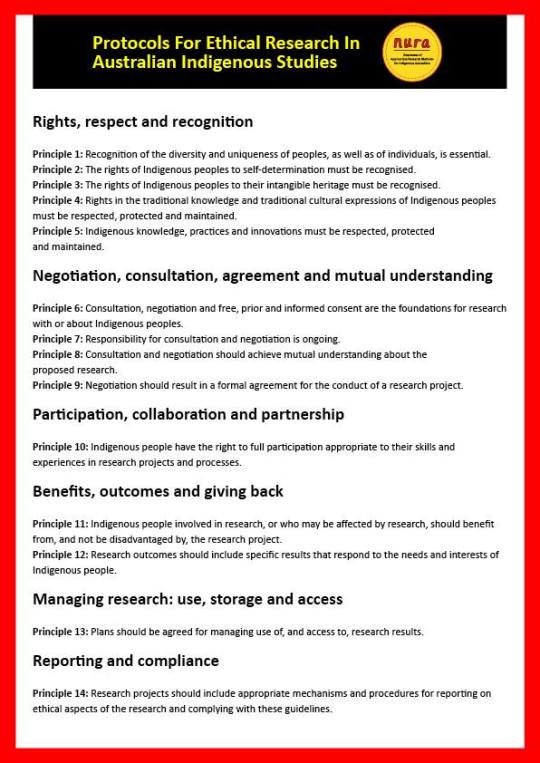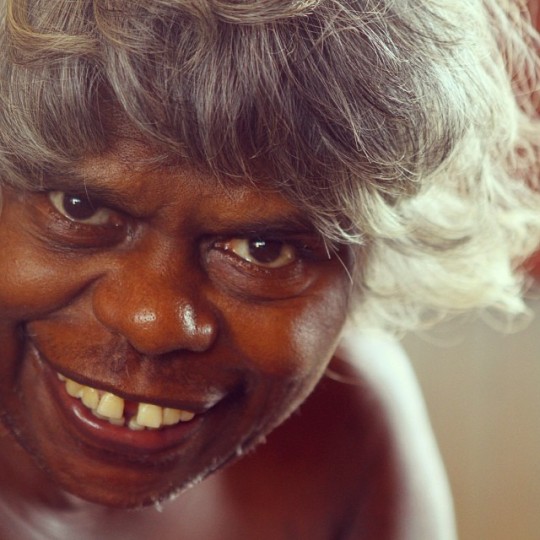Photo

NURA is all about promoting awareness of correct research methods and informing the public on the impacts of negative research, in particular association with Aboriginal and Torres Strait Island people. We offer a service to organize talks with schools, high-schools and colleges where we contact a representative from an appropriate local community to speak with us, answer questions and educate students on Aboriginal practices and correct research methodology. It’s an informative, interesting way for average students to be exposed to the importance of perspective in research, decolonization theory and proper research practices. If you think your community could benefit from this service, please contact us.
For further reading about proper research practices and projects today, check out the Australian National University’s Centre for Aboriginal Economic Policy Research (http://caepr.anu.edu.au/) and The Australian Institute of Aboriginal and Torres Strait Islander Studies (http://www.aiatsis.gov.au/) and their detailed guidelines for Ethical Research in Australian Indigenous Studies (http://www.aiatsis.gov.au/research/docs/ethics.pdf)– two leading institutions in the war on bad research.
All photography courtesy of Justin Brown (browndog productions).
3 notes
·
View notes
Text
Where are we now?
Think of a family going through tragedy. Maybe it is losing a child or parent to sickness or a sudden death, which in itself is devastating but also an everyday occurrence. Think about the impact that has on a family and how long it takes for that pain to go away, how it can change you as a person. Now think about the effect on the community of friends they associate their lives and affections with and the effect on the outer community, those who read about it and feel empathetic pain.
It is easy to grieve for a race as the mistreatments and injustices are many, but the personal level, the empathy of one human to another, can get lost in a topic on such grand scale. It must be remembered that the atrocities many Aboriginal families went through did not happen that many generations ago and the reverberations of colonization, over-research and harsh legislations are still and will continue to be felt in those communities. Community and family are strong beliefs in Aboriginal culture and practice, children being brought up by many adults in the community, family not strictly being about blood relation. It is not only their way of life, but how they carry on their traditions and ancient spirituality, such as the dreaming. Remember how such a normal occurrence as a death in the family can affect a whole community? Apply that to the scale of an entire race, but they were not just being killed, they’re entire existence was sort to be snuffed out, assimilated, lost for all time. Imagine if everything in your world, everything you believed to be true, was taken away from you and replaced with an alien concept of everything. Every Aboriginal child, mother, father, man and woman that was affected by colonization has their own story and their own battle whether it is for their land, their artist rights (the western idea of ‘ownership’ is unlike the Aboriginal counter ideal, but loosely, the Aboriginal people have rights over art and land due to their connection with and responsibility for the subject matter and land) or for their good mental and emotional health. For, among other atrocities, research crippled the Aboriginal people and the trickle effect of its impact has ensured their struggle continue for years to come.
Bad research brought in laws that negatively impacted on them, created a culture of racism that can still be apparent today. Whole communities are still feeling the reverberations but although society cannot go backwards and erase past actions, it can go forward and actively seek better lives for all its citizens, not just those who are part of the ruling class.
Many research projects today are being led by Government organizations in accordance with Aboriginal people, their tribes and representatives. One such example is the way in which child services research Aboriginal children in need of child protection services compared to non-Aboriginal children and what those situations are for both parties and how those situations can be improved, the comparison is not out of racism but to define specific needs.
For instance, if it is deemed necessary for a child to be taken into care, the child is not placed with a white family (and therefor continuing the mentality of the stolen generation), this is ‘The Aboriginal and Torres Strait Islander Child Placement Principle’ that has been enacted in every Australian state. The order of preferred placement is as follows –
* The child’s extended family
* The child’s Indigenous community
* Other Indigenous people
Other modern, correct research has resulted in benefits for the Aboriginal community such as guides to focus on embedding Aboriginal and Torres Strait Islander perspectives in schools (http://deta.qld.gov.au/indigenous/pdfs/eatsips_2011.pdf), or directing focus onto the rampant levels of depression and anxiety within contemporary Aboriginal life, the climate of distrust and mistreatment that fuels it and what can be done to curb it. (for example http://childhealthresearch.org.au/media/54874/chapter6.pdf and http://aboriginal.childhealthresearch.org.au/media/54859/part_1_chapter3.pdf)
It is a continuous struggle with regulating our actions now we know what they can come to. Sadly many people grew up in a culture where they believed they were doing good, and it is an easy trap to fall into, many legislative amendments made were also to legislation that was intended to right the wrongs of the years of colonization but fell short and sometimes were detrimental to their intended task. Therefor it is especially important to be aware of how to approach research, how to present yourself and your work, how to conduct yourself, your intentions and be prepared to question all of them. And remember above all, research belongs to the subject, it is from their perspective that you should conduct it as it is them that will be so deeply affected by it.
#indigenous#australian#Indigenous Australians#aboriginal#Torres Strait Islander#reserach#decolonising methodology#colonisation
1 note
·
View note
Text
Research, a dirty word.
To everyday Australians, research doesn’t mean too much, it connotes neither a positive nor negative meaning. Though for a lot of Aboriginal and Torres Straight Islander communities within Australia, research is a dirty word and many Indigenous Peoples have negative feelings to what it signifies. Over the past two centuries in Australia, Indigenous Australians have been over-researched, and often misunderstood. In the middle to late period of last century, Aboriginal Peoples had been researched excessively to find ways of fixing the ‘Aboriginal problem’.
How people see the world is generally informed by their own experiences, values, norms and education. From the earliest periods of colonisation, ill-informed perceptions and assumptions about the values and ways of Aboriginal and Torres Straight Islander culture and social organisation have emerged from the comparison of the Indigenous Australian world to the spiritual, political and economical perspectives of European colonisers. These colonists concluded the civility and worthiness of Aboriginal and Torres Straight Islander culture by the degree to which they perceived them in complying to European customs and norms.
The earliest observers knew nothing about Aboriginal and Torres Straight Islander Peoples and the substantial errors of judgment had a significant impact on them ever since. Though, Non-Aboriginal society has increasingly improved its knowledge of the ways of Aboriginal and Torres Straight Islander culture since colonisation. Slowly western society began to understand and recognise that Indigenous Australians held principles and cultural values that provided the basis for their communities.
When making judgments about Aboriginal and Torres Straight Islander Peoples, Australia and its public institutions must acknowledge the history, and bridge the difference in cultural outlooks to find a fair, respectful and ethical way forward. Contemporary Aboriginal and Torres Straight Islander societies draw their strength and existence from the body of knowledge, values and wisdom that has emerged from the interaction of tradition and history. It is integral this is understood and respected when collaborating with Indigenous communities.
It is essential that Indigenous Peoples are full participants in research projects that concern them, share an understanding of the aims and methods of the research, and share the result of this work. At all stages, research with and about Aboriginal and Torres Straight Islanders must be founded on a process of meaningful engagement and reciprocity between the researcher and the community. It should also be recognised that there is no sharp distinction between researcher and Indigenous Peoples, as they are both participants and must be regarded as equals in research engagement.
Aboriginal and Torres Straight Islander Peoples feel that they have been the most studies population in Australia, so it is no wonder the word research arouses feelings of suspicion and defensive attitude. The relationship between researchers with Indigenous Peoples has involved little or no consultation with the people affected, and is often one sided and exploitive. Generally this leads to no benefits of the research projects flowing back in to the Indigenous communities. Indigenous Peoples are generally cynical about the benefits of research and cautious towards the colonial mentality or positional superiority ingrained in the psyche of western researchers. The decolonization research methodology is congruent with Indigenous epistemology and is guided by the values and research agenda of Indigenous Peoples.
The decolonization research methodology engages with imperialism and colonisation on multiple levels. One of those levels is concerned with having a more critical understanding of underlying assumptions, motivations and values, which inform research practices. By employing this methodology in all future research projects within Aboriginal and Torres Straight Islander communities, it will assure a shift towards reconciliation.
A perfect example of this ideal form of research methodology can be drawn from the Koori people of Victoria. The Koori people believe they are potentially the most researched Indigenous people in Australia, and hold an extremely skeptical relationship with research of all forms. A workshop held in 2007 proceeded with the favorable concept ‘Research is fine as long as it’s handled by our people’. The goal of the workshop was to listen to the Koori’s community’s views and concerns about research, look at the barriers and the enablers in the community in health research, and to work out ways of facilitating community control of health research.
The clear message that came out of these workshops is that participants wanted Koori health research to be controlled and facilitated by Koori’s. For this to happen, Aboriginal and Torres Straight Islander community organisations need to play a key role in research and in its dissemination, implementation and evaluation. The national Indigenous research reform agenda has created a momentum for change in this direction.
Here at Nura, we are committed to supporting the development of Aboriginal and Torres Straight Islander community research. We aim to support evolving capacity through leadership, curriculum development, community involvement, increased resources and greater mainstream recognition of the value of the decolonizing research methodology.
#indigenous australians#indigenous#decolonising methodology#research#education#nonprofit#firstpeoples#first peoples#aboriginal#Torres Strait Islander
1 note
·
View note
Photo

#tshirt#shirt#marketing#nura#aboriginal#indigenous australians#research#reconciliation#decolonising methodology#colonisation#history
0 notes
Photo

#burger#nura#aboriginal#Torres Strait Islander#research#reconciliation#decolonising methodology#colonisation#education#ethics#marketing#spreadtheword
1 note
·
View note
Text
Lest we forget. The race of people pushed aside to create our nation.
Since first contact between white colonists and the Aboriginal people, research has been conducted into Aboriginal life, culture, well-being and biology but it wasn’t until recently that the findings of that research improved the lives of the Aboriginal people or were the research methods themselves respectful, inclusive or constructive for the Aboriginal culture. Till recent history, Aboriginal people, their land, culture and basic human rights were devastated from being over-researched. A lot of the research undertaken on the supposed basis of improving the Aboriginal’s lifestyles was simply the means in which to eradicate their race altogether. This is based on the theory that colonists had the monopoly on how to live and what is considered barbaric and needs to be rectified, this can be witnessed by examining some of the important legislation throughout Australian history that was passed to issue more control of Aboriginal people and their affairs to the white Australian government.
1869 An Act for the Protection and Management of the Aboriginal Natives of Victoria (Victoria), first scheme to regulate the lives of Aborigines, a board of non-Aboriginal people served to control where Aboriginal people could live, work, what kind of work, who they associate with and who they are allowed to marry.
1897 Aboriginals Protection and Restriction of the Sale of Opium Act (QLD followed by similar legislation in the other states), a thinly-veiled act partially to address the use of Chinese opium among Aboriginals, but more aptly described as putting measures in place to severely control and negatively affect Aboriginal people and their rights.
1953 Wards Employment Ordinance (Northern Territory), limiting employment and income and in some circumstances pay was withheld, and placed in a trust fund to be implemented by the government how it sees fit.
These laws show that the poor, exploitive research and un-informed observation of the colonists resulted in horribly detrimental laws made for but without the input of Indigenous Aboriginal Australians for the better part of the western occupation of Australia.
Although there have been many laws and amendments created that benefit Aboriginal people in more recent years they are after the fact, apologetic laws, as what has been taken from the Aboriginal people cannot be given back. The treatment of their people, their land and customs was horrific and their devastation paved the way for what modern Australia is today. The laws above, however, not only stripped Aboriginals of basic rights, they created segregation between colonists and Aboriginals where Aboriginal people were treated as lesser beings. Thus creating and perpetuating a negative environment where not only were Aboriginal people demonized and so victimized but it allowed for emotional and physiological problems to flourish such as drug use and low self-esteem, problems the Aboriginal people would not have encountered were it not for colonization. A fact that still eluded governing people at the time - the 1897 Act above came in to being to supposedly free Aboriginals from the problems they were facing because of Chinese opium suppliers, they blamed the Chinese for their involvement but would not blame themselves for their own.
Reflecting on the history of colonist involvement in Aboriginal affairs it can be argued that if the colonists hadn’t over-research the Aboriginal people with western ideals, if they had forethought of their actions, or were as mindful as we are today, that there was a chance for a multicultural Australia to be created through peaceful and inclusive means. It is through situations like the colonization of Australia that the world learns from, and learns not to repeat. But it is a truth, that over human history, races interact, rise and fall and it is only through our mindful actions that we can get a positive outcome for all parties involved. It is a sad truth of the modern world that all habitable areas of land will be colonized, humans expand. However it is in questioning that ‘fact’, seeing what has happened in the past and challenging why we need to develop in certain ways in order to advance, that will be the savior of our potential future atrocities, and which could have saved the Aboriginal people, their culture and their land, a lot of hardship. Research should be purely for the social and scientific benefit of the subjects and inclusive of their rights, culture and input. Therefore, especially in the case of the Aboriginal people based on their culture, research should be the property of the subject.
It can be noted that in having no experience with another race, had the colonists not so aggressively tried to wipe them out, had they seen us as equals, as comrades or friends, maybe, and maybe is highlighted, the climate of secrecy behind some of their culture could have lifted. That’s not to say they’d be publications today mapping out the intricacies of Aboriginal culture for any eyes to see, but perhaps if the relations between the white colonists and the aboriginals had been respectful (have foresight) we could have shared and embraced the gift that it would be to truly learn their culture. You cannot take the right to knowing a people, but in some instances with other native peoples you can earn it, and they did not. Hopefully it is through circumstances such as the plight of the Australian Aboriginals that people globally can apply knowledge, empathy and understanding in all future racial, religious or cultural encounters, whether they are on a private, public, or global scale.
Lest we forget.
#research#indigenous#australia#indigenousaustralians#protocols#practices#education#reconciliation#ethics#decolonising methodology#colonization#Torres Strait Islander
0 notes

